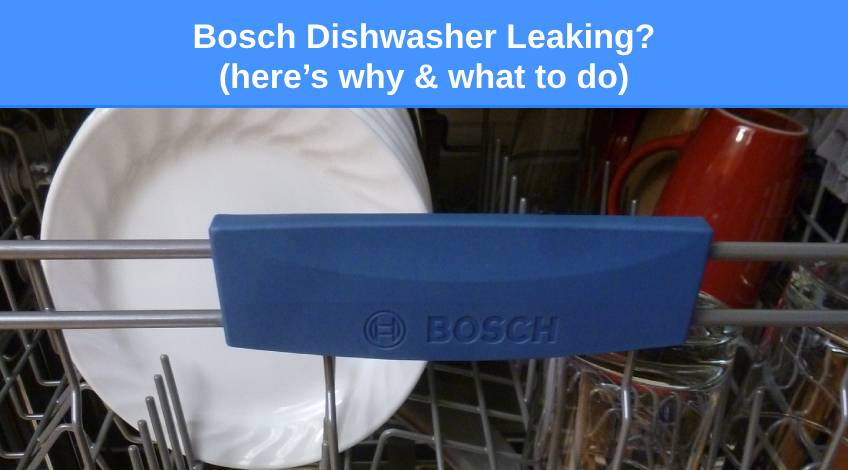
Bosch Dishwasher Leaking? (here’s why & what to do)
Any appliance that is connected to the water supply is susceptible to leaks, and your dishwasher is no exception. Sometimes the problem causing the dishwasher to leak is easy to fix at home without any technical skills at all.
If you own a Bosch dishwasher and it has suddenly developed a leak, keep reading. In this article we take a close look at what can cause a dishwasher to leak as well as offering the best ways to solve this annoying issue.
What Causes A Bosch Dishwasher To Leak?
There are a few things that could cause a Bosch dishwasher to leak which include;
| Probable Cause | Solution |
|---|---|
| Using too much or the wrong type of detergent | Always ensure that you use the correct type of detergent in the correct quantity |
| Defective Door Seal | Inspect and replace the door seal if necessary |
| Defective water inlet valve | Contact a technician |
| Hose Leak | Inspect the inlet hose and drain hose and tighten/replace as necessary |
| Defective spray arm | Inspect the spray arms and clean as necessary |
| Defective float switch | Inspect and replace the float switch if necessary |
| Damaged detergent dispenser | Inspect and clean/replace the detergent dispenser as necessary |
| Clogged filter | Remove and clean the filter |
| Defective pump | Contact a technician |
| Damaged tub | Inspect the tub and contact a technician if it proves to be damaged |
| Dirty dishwasher | Run a hot service wash and clean the dishwasher thoroughly |
Let’s take a closer look at each of these issues;
Using Too Much Or The Wrong Type Of Detergent
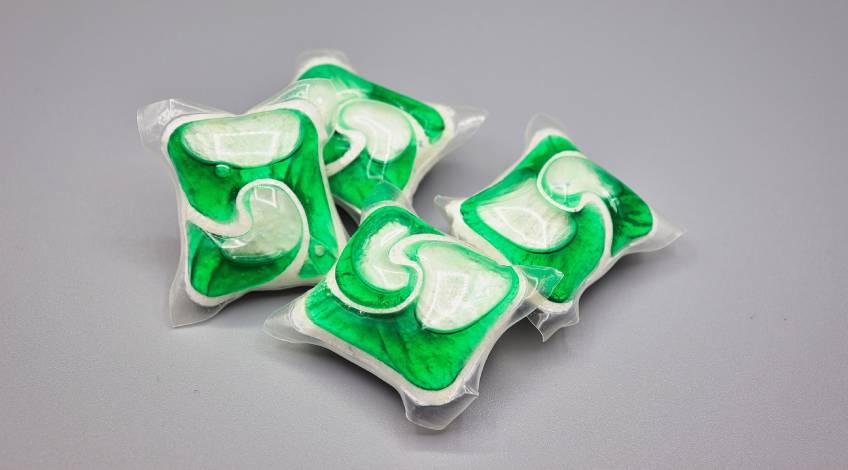
If you use too much detergent it can create too many soap suds. Which can cause the dishwasher to fill with soap suds to the point where they overflow from the appliance and cause the dishwasher to leak.
This can also be the case if you use the wrong type of detergent in your dishwasher. For instance, using washing up liquid in a dishwasher will create way too many soap suds.
If you find that your dishwasher is full of soap suds, try placing a bowl half full of milk on the top rack and running a short cycle. The soap suds will bind with the fat content in the milk and drain away.
To prevent your Bosch dishwasher from leaking due to excessive soap suds. Always ensure that you only use the correct type of detergent in the right quantity.
Defective Door Seal
Around the door of the dishwasher there is a rubber gasket or seal. Once the door is closed that rubber gasket forms a watertight seal to prevent your kitchen from becoming flooded.
If that gasket is damaged in any way, it will no longer create a watertight seal and water will leak around the door when the dishwasher is running.
You will need to check the door gasket thoroughly, looking for any frays or tears or even any trapped food particles, debris or detergent residue that could be preventing the door from closing fully.
Wipe any debris away using a soft cloth and if there is any damage to the gasket, it will need to be replaced.
Defective Water Inlet Valve
All of the water that enters the dishwasher does so via the water inlet valve. This valve opens when it receives a message from the control board and allows water into the tub.
Once the control board receives a message telling it that there’s enough water to wash or rinse the dishes, it sends another message to the inlet valve to shut off.
If the inlet valve becomes faulty, it might continue to allow water into the tub after it is supposed to have stopped. This will cause an excess of water in the tub which will eventually leak out.
In some cases, the leak could even be coming from the inlet valve which could cause a large patch of water under your dishwasher.
We recommend getting a technician to investigate and fix this problem as it involves dismantling parts of the appliance.
Hose Leak
There are 2 main hoses attached to your Bosch dishwasher. They are; the inlet hose and the drain hose. The inlet hose allows water from the water supply into the inlet valve to fill the appliance.
The drain hose takes all of the wastewater away from the dishwasher and sends it down the main drain. If either of these hoses develops a leak or the connectors which connect these hoses to the appliance become loose, the result will be a water leak.
You will need to check each hose for any signs of a blockage or damage and replace them if necessary. You should also check around the connections where the hoses are connected to the appliance for any water marks and tighten as necessary.
Defective Spray Arm
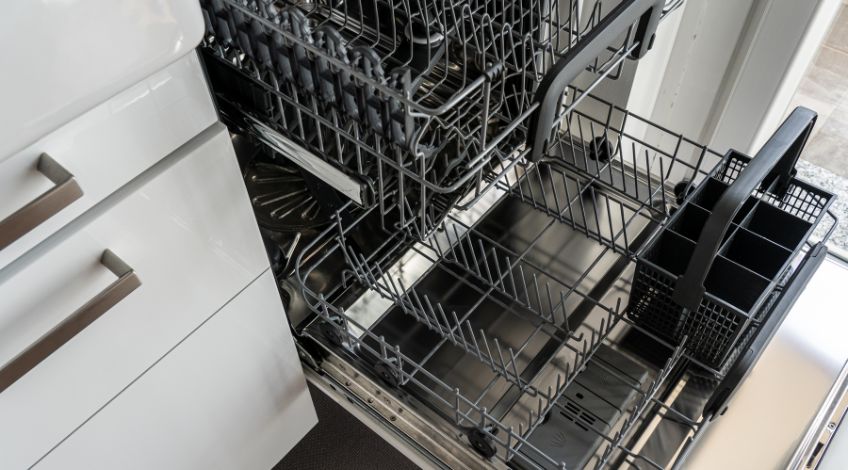
The spray arms distribute water to every part of the dishwasher, ensuring all dishes get washed and rinsed. They do this by turning in every direction.
If the nozzles on the spray arms are clogged with food particles, debris, detergent or even limescale, the water will not get distributed evenly through the appliance.
It’s also possible for the spray arm to become blocked by a large dish or utensil preventing it from rotating. This will mean all of the water from that spray arm will be concentrated on one spot. Which can cause too much water to build up in one area leading to a leak.
You will need to inspect the spray arms and ensure that they can move freely. Then check the nozzles and clear any blockages or potential blockages. From then on, you should make the spray arms part of your regular cleaning schedule on your dishwasher.
Defective Float Switch
The float switch is a small device fitted at the bottom of the tub. It is responsible for detecting the water level in the dishwasher and preventing the flow of water once the tub is full.
If the float switch becomes stuck or malfunctions, it can lead to water leaking from the dishwasher. You can check the float switch by first, removing the lower rack.
Gently lift the float switch to make sure it’s not stuck in the up position. If it is malfunctioning, it will need to be replaced. We recommend getting a technician to replace the float switch for you.
Damaged Detergent Dispenser
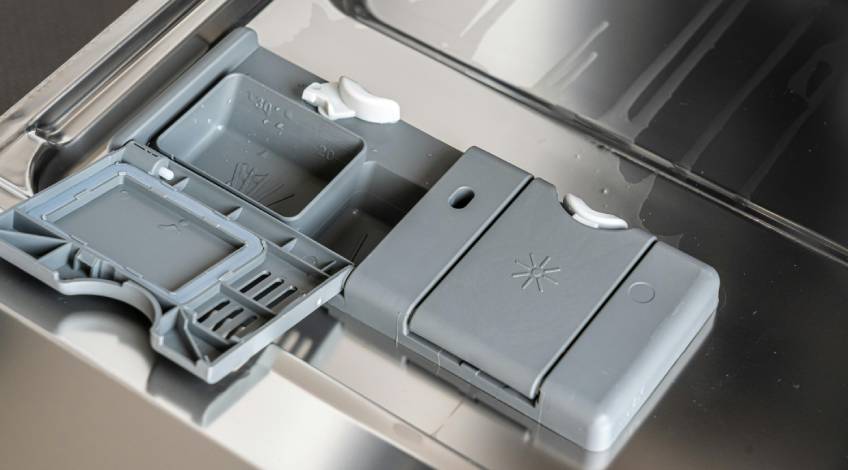
If the detergent dispenser is damaged or has a clog due to excessive detergent build up, it can cause the dishwasher to leak during the wash cycle.
You will need to check the detergent dispenser and look for any signs of damage or detergent build up. You can clean the dispenser using warm soapy water and a toothbrush.
If the dispenser is damaged, it will need to be replaced which is a job best left to a technician.
Clogged Filter
The filter on your Bosch dishwasher is designed to trap any food particles or other debris and prevent them from returning to the clean dishes or damaging any of the dishwasher’s components.
Over time, the filter can become clogged with food particles, debris and even limescale. This could prevent wastewater from leaving the appliance which could cause a leak.
You will need to remove the filter and wash it using warm soapy water. Any stubborn stains can be removed using a toothbrush or similar or, soak in a white vinegar/water solution (50:50 mix).
Defective Pump
If the pump on your Bosch dishwasher develops a fault, it could leak water which will be visible underneath the appliance. This could be caused by a defective seal or a crack in the pump housing.
We recommend contacting a technician to investigate and repair/replace the pump for you.
Damaged Tub
The dishwasher tub is the main interior area of the appliance. If there are any cracks or signs of damage to the tub, water can easily leak from the tub during the wash and rinse cycles.
You can inspect the tub visually and if you notice any signs of damage that you suspect could be the cause of the leak, we recommend contacting a technician immediately.
Dirty Dishwasher
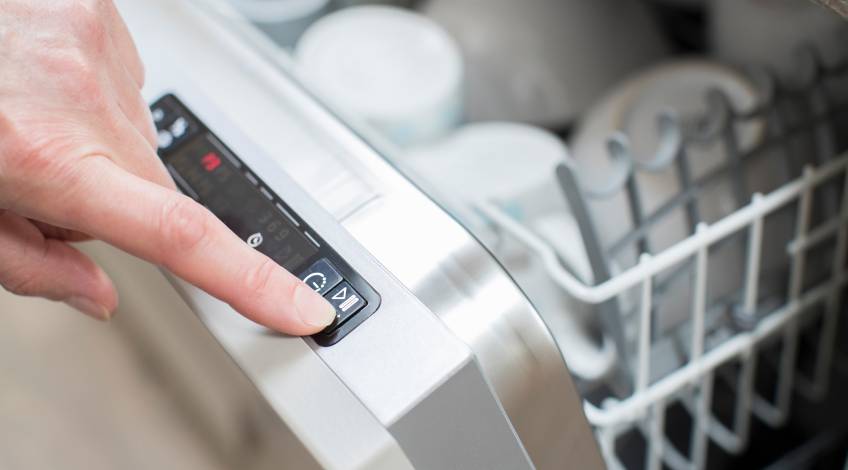
In some cases, the dishwasher can leak due to a build up of dirt, detergent residue or limescale. You can either run a hot service wash using a proprietary dishwasher cleaner, or run a hot wash after placing a bowl of white vinegar on the top rack.
Once the hot wash has finished, you should wipe all around the door seal, remove the filter and clean the detergent dispenser. This will help to remove any dirt or other build up that might have caused the dishwasher to leak.
SEE ALSO: Where Are Bosch Dishwashers Made?
Frequently Asked Questions
If your Bosch dishwasher is leaking at the bottom, it could be due to; a defective float switch, a defective pump, a faulty inlet valve, a leaking hose, a damaged tub, a defective door seal or a clogged filter.
If your dishwasher is leaking from the front door, it is most likely to be caused by a damaged, leaky door seal. In some cases this could be caused by a build up of dirt, detergent residue or limescale. If that is the case a simple clean should solve the issue. If not, you may need to replace the door seal (gasket).
Whilst a plumber can fix some dishwasher problems, you will be better off contacting a dishwasher technician to fix your leaking dishwasher. A dishwasher technician will have more specialised knowledge and be able to quickly diagnose and fix any dishwasher related problems.
Also, follow us on Pinterest ...



